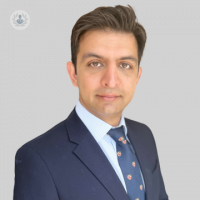What’s causing the pain in my neck?
Written in association with:Neck pain is highly common among people of all ages. Bad posture, hunching over a computer all day long, and sleeping funny can all cause pain in the neck. Other times, pain in the neck may be a side effect of osteoarthritis or a symptom of an underlying health problem.
To find out more about neck pain, what causes it and what we can do to prevent it, we interviewed Mr Fahid Rasul, renowned consultant neurosurgeon and spinal surgeon.

What are the symptoms of neck pain?
The most common symptoms of neck pain are:
- pain that gets worse when the head is in one position for a long time, such as driving or working at a computer
- muscle stiffness
- muscle spasms
- limited range of movement in the neck (side-to-side or up-and-down)
- headaches
When should I see a doctor?
Usually, neck pain improves within a couple of weeks with treatment at home. If the pain isn’t going away after a few weeks, it is recommended to visit your doctor.
You should always seek medical advice:
- If your neck pain is a result of trauma from a fall or a car accident.
- If your neck pain is very severe.
- If your neck pain is persistent for over a week with no relief.
- If your neck pain spreads down your arms or legs, or is accompanied by weakness, tingling and numbness.
What causes neck pain?
The neck bares the weight of the head, which is quite heavy, so of course it is susceptible to:
- Injuries: Trauma from trips, falls, car accidents, or rapid movements of the neck (from headbanging at a rock concert, for example) can result in straining the muscles, tendons and ligaments in the neck, causing pain.
- Wear-and-tear: Joints in the neck can wear down over time, leading to pain.
- Muscle strains: Sitting at a computer all day or sitting with bad posture for a long period of time can strain the neck muscles and cause pain.
- Compressed nerves: Sometimes, discs in the neck can become herniated and press down onto nerves which run from the spinal cord to the arms. This can lead to neck pain, weakness, numbness and tingling.
- Certain diseases: Diseases like meningitis, cancer and arthritis may be the underlying cause of neck pain, although this is rare.
Preventing neck pain
As neck pain is mostly associated with poor posture and wear-and-tear, there are some lifestyle changes which can help prevent some neck pain, such as:
- Improving your posture when standing and sitting.
- Taking frequent breaks to get up from your work desk to move around.
- Adjusting your desk and screen height so that your screen is at eye level.
- Quitting smoking.
- Sleeping in a good position.
Treating neck pain
Luckily, most neck pain heals itself after a few weeks. Over-the-counter painkillers and alternating between hot and cold can help relieve pain and discomfort.
If neck pain persists, on the other hand, you may be prescribed stronger pain medication by your doctor. Physical therapy can also help with pain.
If all fails and you have neck pain that lasts over several weeks and months, steroid injections might be recommended. These involve injecting corticosteroid near the nerve roots and into the facet joints to relieve the pain. As a last resort, decompression surgery will be carried out to release the compressed nerve that’s causing the pain.
For more information regarding neck pain or to book a consultation with a specialist who can get to the root of your pain, head on over to Mr Fahid Rasul's Top Doctors profile.


